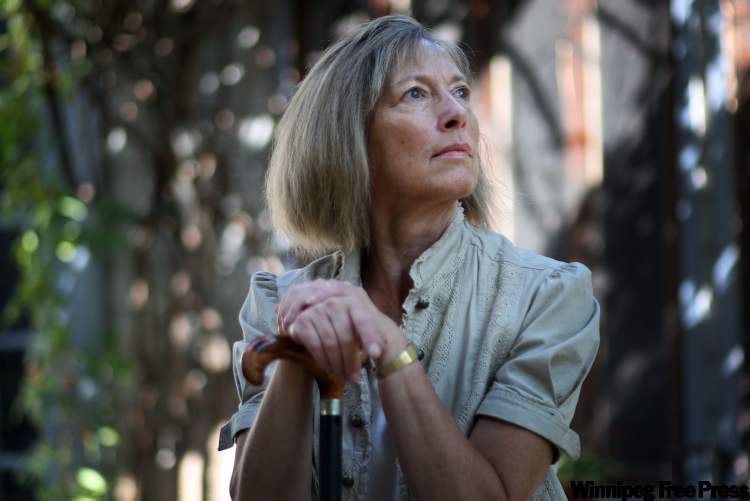MS sufferers losing hope for Manitoba trials
Advertisement
Read this article for free:
or
Already have an account? Log in here »
To continue reading, please subscribe:
Monthly Digital Subscription
$0 for the first 4 weeks*
- Enjoy unlimited reading on winnipegfreepress.com
- Read the E-Edition, our digital replica newspaper
- Access News Break, our award-winning app
- Play interactive puzzles
*No charge for 4 weeks then price increases to the regular rate of $19.00 plus GST every four weeks. Offer available to new and qualified returning subscribers only. Cancel any time.
Monthly Digital Subscription
$4.75/week*
- Enjoy unlimited reading on winnipegfreepress.com
- Read the E-Edition, our digital replica newspaper
- Access News Break, our award-winning app
- Play interactive puzzles
*Billed as $19 plus GST every four weeks. Cancel any time.
To continue reading, please subscribe:
Add Free Press access to your Brandon Sun subscription for only an additional
$1 for the first 4 weeks*
*Your next subscription payment will increase by $1.00 and you will be charged $16.99 plus GST for four weeks. After four weeks, your payment will increase to $23.99 plus GST every four weeks.
Read unlimited articles for free today:
or
Already have an account? Log in here »
Hey there, time traveller!
This article was published 07/01/2012 (5106 days ago), so information in it may no longer be current.
Saskatchewan has abandoned homegrown clinical trials meant to test a new multiple sclerosis therapy, and MS sufferers are worried Manitoba might do the same.
After it put out a call to researchers willing to study the so-called liberation therapy, Saskatchewan received only one proposal for clinical trials last June, and that proposal did not meet criteria. Saskatchewan has since farmed out trials to the United States.
Meanwhile, Manitoba was slated to announce last month which researchers will share $5 million earmarked for clinical trials in this province. But the government won’t say how many research proposals it received, how many were chosen for peer review or how many made the short list.

Local MS sufferers are starting to lose hope.
“Saskatchewan had all kinds of trouble trying to get clinical trials off the books there. The Canadian government still doesn’t have anything happening. I really wish it was different,” said Ingeborg Boyens, a Winnipeg journalist who travelled to New York to get the MS liberation therapy.
“I wish we could say there were individuals in Manitoba who really wanted to pick this up and run with it. But I just don’t have any sense that there are individuals who are prepared to put clinical trials together. I’m actually extremely cynical about this one. I don’t know that much is going to happen,” she said.
Like Boyens, Duncan Thornton received the liberation-therapy treatment outside Canada. He travelled to Poland last year with his brother, who also has MS.
Thornton thinks one of the research roadblocks might be that neurologists doing clinical trials aren’t convinced the therapy actually works.
“Fundamentally, most of those people do not believe the treatment could be successful and don’t believe that there could be anything to it,” Thornton said. “It’s not that I suspect that there’s a conspiracy, but they have every incentive to not set up a test, say, for example, involving those doctors who’ve already successfully performed the procedure a number of times.”
Last spring, with significant fanfare, the province earmarked $5 million and put out a call for proposals relating to the liberation-therapy treatment. At the time, the Manitoba government intended to partner with Saskatchewan.
The province’s deadline to receive proposals was Sept. 30, and scientific peer review was to be completed in November.
Despite two separate freedom-of-information requests, Manitoba Health would not release any information regarding how many proposals were received or how many went for peer review.
A spokesman for Manitoba Health said due to the Manitoba Health Research Council’s protocol, the number of proposals, the names of applicants and individuals sitting on the review committee cannot be released to the public.
“Once a successful research team or teams has been selected, the MHRC will advise Manitoba Health and we’d be pleased to provide this information to you,” the spokesman said in an email.
The funding decisions regarding the clinical-trial research are set to be announced some time in December.
“Every month that we delay introducing this treatment in Manitoba means more people become disabled, more people will end up in wheelchairs, more people will go blind, more people will die,” said Thornton.
dani.r.finch@gmail.com terryn.shiells@gmail.com

